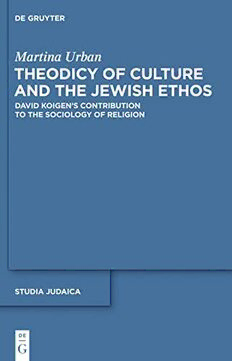
Theodicy of Culture and the Jewish Ethos: David Koigen’s Contribution to the Sociology of Religion PDF
Preview Theodicy of Culture and the Jewish Ethos: David Koigen’s Contribution to the Sociology of Religion
Martina Urban Theodicy of Culture and the Jewish Ethos Studia Judaica Forschungen zur Wissenschaft des Judentums Begründet von Ernst Ludwig Ehrlich Herausgegeben von Günter Stemberger Band 63 De Gruyter Martina Urban Theodicy of Culture and the Jewish Ethos David Koigen’s Contribution to the Sociology of Religion De Gruyter ISBN 978-3-11-024772-5 e-ISBN 978-3-11-024773-2 ISSN 0585-5306 LibraryofCongressCataloging-in-PublicationData ACIPcatalogrecordforthisbookhasbeenappliedforattheLibraryofCongress. BibliografischeInformationderDeutschenNationalbibliothek DieDeutscheNationalbibliothekverzeichnetdiesePublikationinderDeutschen Nationalbibliografie;detailliertebibliografischeDatensindimInternet überhttp://dnb.dnb.deabrufbar. ”2012WalterdeGruyterGmbH&Co.KG,Berlin/Boston Satz:ClaudiaWild,Konstanz DruckundBindung:Hubert&Co.GmbH&Co.KG,Göttingen (cid:2) GedrucktaufsäurefreiemPapier PrintedinGermany www.degruyter.com Acknowledgments I wish to thank the following foundations for their generous support of this project: The Memorial Foundation for Jewish Culture, New York, and the Leo Baeck Institute New York for the Career Development Grant which pro- vided me with the means to pursue the research on Koigen in Germany and Israel. At an early stage of this project, Vanderbilt University awarded me with the University Research Grant which allowed me to take a full sab- batical and to sift through archival material in Jerusalem. Among the individuals who were supportive of this project and helpful in many ways are Mira Zakai, the granddaughter of David Koigen, and her husband, Jacob. The wonderful personal contact that emerged over the years and led to several meetings in Berlin and Givatayim, Israel, provided me with a living and warm context that compensated for the effort of ren- dering Koigen’s thought into a contemporary idiom. I wish to thank the staff of the Central Archive for the History of the Jewish People (CAHJP) in Jerusalem, the Martin Buber Archive at the National and University Library Jerusalem, and the Albert Einstein Archive for their patience and assistance. I would also like to extend my sincere gratitude to Dr. Albrecht Döhnert of the Walter de Gruyter Verlag in Berlin and Professor Günter Stemberger for their endorsement of this project. An important intellectual interlocutor was Verena Dohrn who shares my interest in David Koigen. Conventional forms of expressing gratitude do not suffice when it comes to the guidance from Paul Mendes-Flohr. In the last years I benefited immensely from many stimulating conversations, and his willingness to review drafts of single chapters. Throughout the last years, colleagues and friends com- mented on the work in progress, on chapters or conference presentations that touched upon aspects of Koigen’s thought and helped me to reorganize the material and to sharpen the focus. I gained inspiration on the meaning of religion in a variety of modern contexts from students and discussions in my Jewish Theories of Religion class at Vanderbilt. The book could not have been completed without the support of some of my colleagues at Vanderbilt, who, unknowingly, gave my work on this topic an uncanny existential relevance. I wish to extend my sincere and deepest gratitude to Lenn E. Goodman, David Wasserstein, Idit Dobbs- Weinstein, and Lewis Baldwin. I would like to take this opportunity to thank the administration of Vanderbilt University for its trust. I thank Rich- VI Acknowledgments ard B. for helping me out along the way. For their friendship and many moments of happiness I wish to thank my dear and unforgotten friend Angela Lin and my friend and colleague Annalisa Azzoni. In Berlin, I wish to thank my friends Monti and Dietrich for their support, many good con- versations, and above all their amazing commitment to creating a neigh- borly community. I wish to thank Klaus for his scientific optimism. I owe an immeasurable amount of gratitude to my parents and thank them for their patience, support, and resourcefulness. And then there is love for the one who proved conventional storytelling wrong: Steve. Berlin, January 2012 Contents Acknowledgments IX Abbreviations XI Introduction 1 Chapter One Theodicy of Culture and the Theory of the Cultural Act 33 Chapter Two Beyond the a priori: Toward a Religion of Intimacy 68 Chapter Three Resituating Judaism: On Pragmatism and Phenomenology 94 Chapter Four Ethos: A non-Essentialist Perspective on Religion and Ethnicity 126 Epilogue: Towards a Sociology of Jewish Religious Knowledge 175 Bibliography of Koigen’s Works 182 Appendix 185 Das Ethos im Judentum 187 Index 261 Abbreviations Abbreviation key to works by Koigen1 AR – Apokalyptische Reiter/Apocalyptic Horsemen (1925) ASW – Der Aufbau der sozialen Welt im Zeitalter der Wissenschaft/The Construction of the Social World in the Age of Science (1929) EJ – Das Ethos im Judentum/The Ethos in Judaism (1923) HI – Das Haus Israel/The House of Israel (1934) IPK – Ideen zur Philosophie der Kultur/Ideas on a Philosophy of Culture (1910) KD – Die Kultur der Demokratie/The Culture of Democracy (1912) KS – Die Kulturanschauung des Sozialismus/The Cultural Conception of Socialism (1903) MG – Der moralische Gott/The Moral God (1922) Prot. – Protocols of the Philosophische Arbeitsgemeinschaft, 1930 – 1932 (unpublished) ZVS – Zur Vorgeschichte des modernen philosophischen Socialismus in Deutschland/On the Prehistory of Modern Philosophical Social- ism in Germany (1900) 1 For abbreviations of article titles see the bibliography of Koigen’s writings in this book
